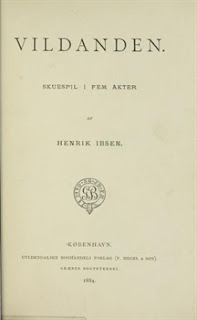Life-purposes versus life-illusions
In his play The Wild Duck (original title: Vildanden) the Norwegian playwright Henrik Ibsen explores, among other themes, the rivalry between absolute ideals and life-illusions (or life-lies) in the context of family relations.
For Gregers, one the main characters of the play, to have a purpose (in the original: opgave) in life, to know why one lives, is a life-and-death matter. Right from the start, he proclaims the pursuit of the "ideal" as his personal purpose: he wants to bring the skeletons out of the closet and dispel any lies that underlie and smudge human relationships. Only then are people able to create strong and genuine bonds that can last over time.
This demeanor seems reckless in some respects: to face the facts may mean to rip up the foundations of existing social relations. Besides, as Relling, the direct opposite of Gregers, cynically remarks at several points, lies are somehow necessary to sustain life and can even become its stimulating principle:
"Rob the average man of his life-illusion, and you rob him of his happiness at the same stroke."
As Gregers listens to his crystalline "claim of the ideal", he doesn't listen to others. He wants to reshape —or even overturn— societal norms, yet he can't tune in with peoples' basic qualities: he expects too much from them. The enmity towards life-lies (in other words: the delusions, or the "marsh") along with his absolute devotion to the ideal —including its supposedly cathartic and restorative effects— are his only remaining driving forces, and perhaps his own life-illusion. Such beliefs tend to calcify, and in the end they become impenetrable -- peoples' minds do not change, not even after a cruel twist of fate…
In a metaphorical sense, ideals illuminate, "cleanse the air". People truly need a purpose in life, just so they can keep on moving -- this is Relling's remedy to save Hjalmar from self-contempt. But, a blind adherence to lofty aspirations fatally undermines the condition of life, that is, the vital illusions.
The non-conformist Gregers opposes the dishonesty that perfuses society, but he's too idealistic to be effective. He clings desperately to his ideal, because his life would otherwise be empty and meaningless. The pragmatist and conformist Relling dismisses Gregers' arguments and exposes his ungainly obsession with chimeras: such noble claims and the like are only life-illusions in disguise. And since Gregers' life-illusion (i.e. purpose) is to stamp out the lies that permeate society, then his stimulating principle is perhaps a self-destructive one.
Does a spirited yet quixotic individual stand any chance against steamrolling reality?
 |
| Cover page of the first edition. Copenhagen, 1884. |



